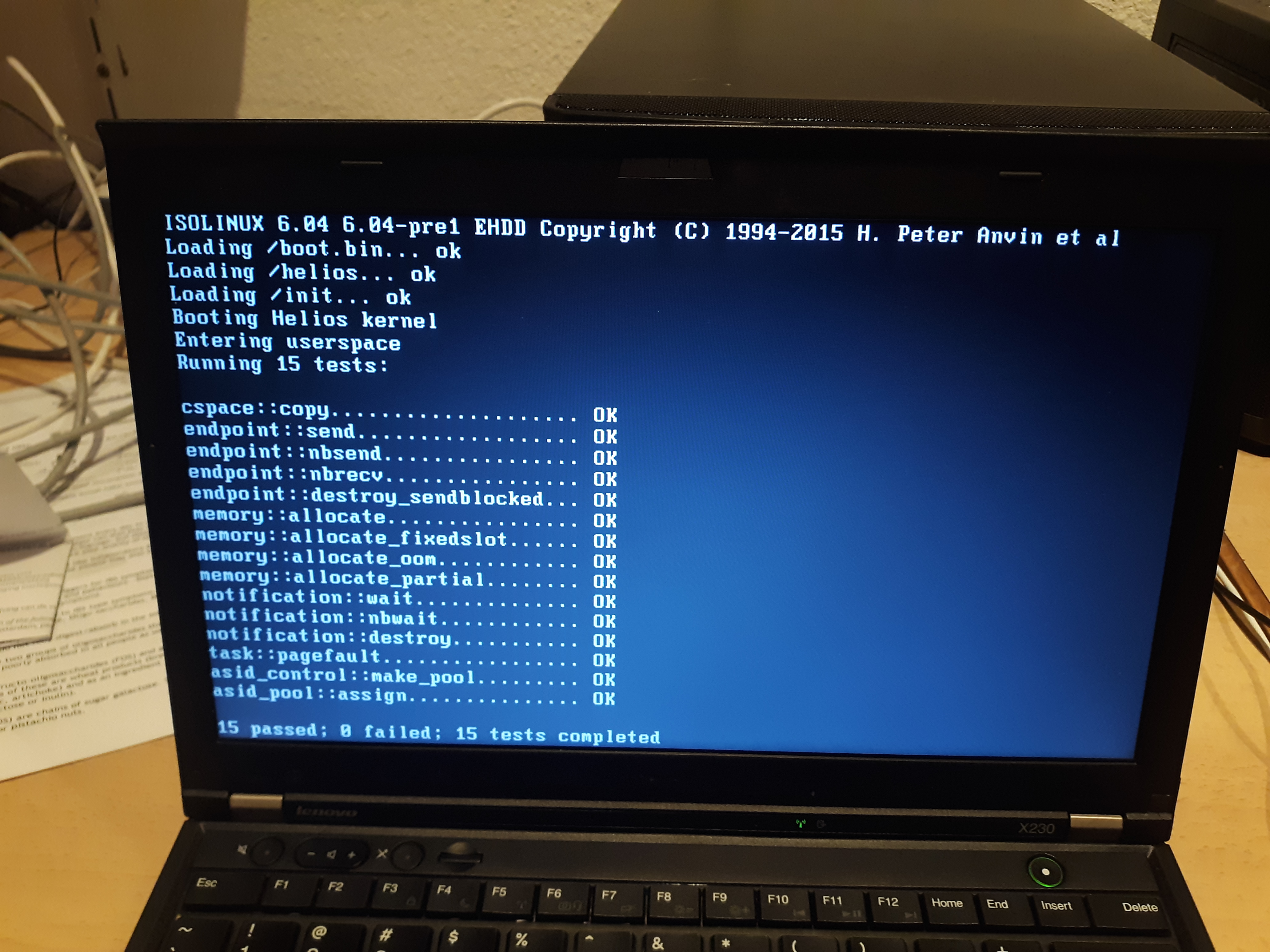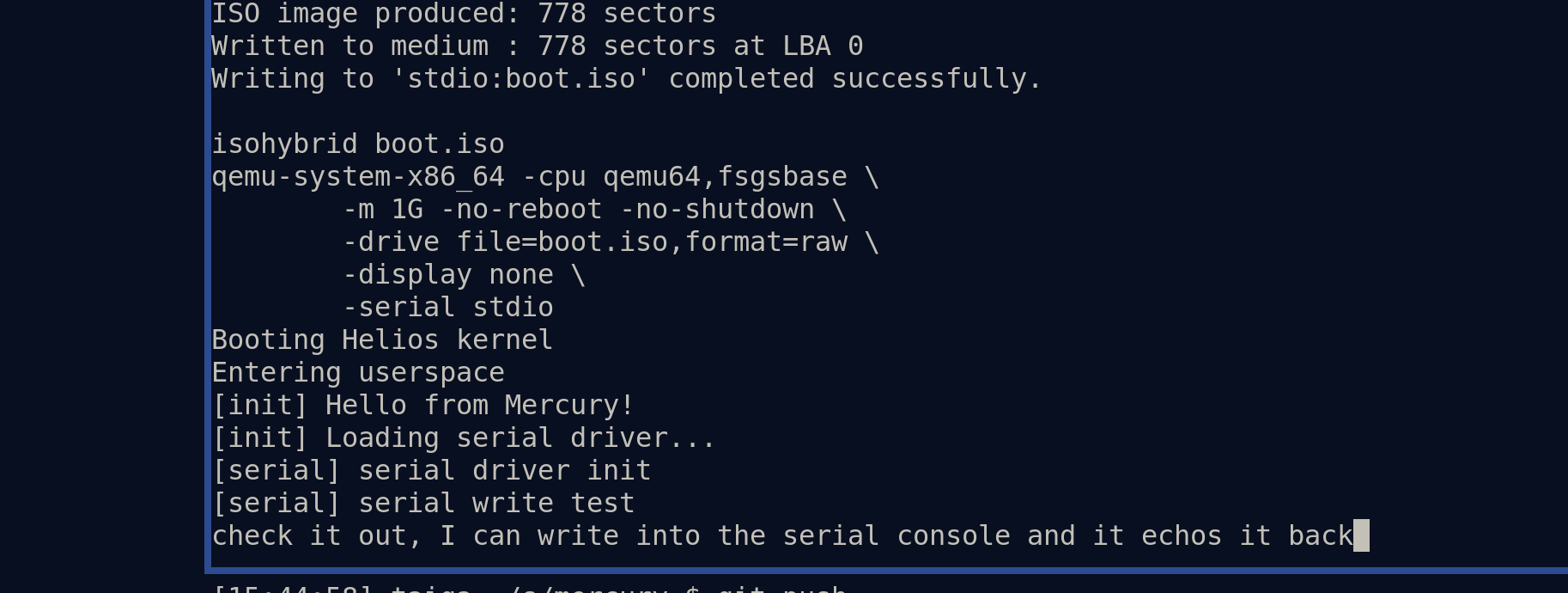Status-update-October-2022.md (7044B)
- ---
- title: Status update, October 2022
- date: 2022-10-15
- ---
- After a few busy and stressful months, I decided to set aside October to rest.
- Of course, for me, rest does not mean a cessation of programming, but rather a
- shift in priorities towards more fun and experimental projects. Consequently, it
- has been a great month for Helios!
- Hare upstream has enjoyed some minor improvements, such as from Pierre Curto's
- patch to support parsing IPv6 addresses with a port (e.g. "[::1]:80") and Kirill
- Primak's improvements to the UTF-8 decoder. On the whole, improvements have been
- conservative. However, queued up for integration once qbe upstream support is
- merged is support for @threadlocal variables, which are useful for Helios and for
- ABI compatibility with C. I also drafted up a proof-of-concept for @inline
- functions, but it still needs work.
- Now for the main event: Helios. The large-scale redesign and refactoring I
- mentioned in the previous status update is essentially complete, and the kernel
- reached (and exceeded) feature parity with the previous status quo. Since Helios
- has been my primary focus for the past couple of weeks, I have a lot of news to
- share about it.
- First, I got back into userspace a few days after the last status update, and
- shortly thereafter implemented a new scheduler. I then began to rework the
- userspace API (uapi) in the kernel, which differs substantially from its prior
- incarnation. The kernel object implementations present themselves as a library
- for kernel use, and the new uapi module handles all interactions with this
- module from userspace, providing a nice separation of concerns. The uapi module
- handles more than syscalls now — it also implements send/recv for kernel
- objects, for instance. As of a few days ago, uapi also supports delivering
- faults to userspace supervisor processes:
- 
- ```hare
- @test fn task::pagefault() void = {
- const fault = helios::newendpoint()!;
- defer helios::destroy(fault)!;
- const thread = threads::new(&_task_pagefault)!;
- threads::set_fault(thread, fault)!;
- threads::start(thread)!;
- const fault = helios::recv_fault(fault);
- assert(fault.addr == 0x100);
- const page = helios::newpage()!;
- defer helios::destroy(page)!;
- helios::map(rt::vspace, 0, map_flags::W | map_flags::FIXED, page)!;
- threads::resume(thread)!;
- threads::join(thread)!;
- };
- fn _task_pagefault() void = {
- let ptr: *int = 0x100: uintptr: *int;
- *ptr = 1337;
- assert(*ptr == 1337);
- };
- ```
- The new userspace threading API is much improved over the hack job in the
- earlier design. It supports TLS and many typical threading operations, such as
- join and detach. This API exists mainly for testing the kernel via Vulcan, and
- is not anticipated to see much use beyond this (though I will implement pthreads
- for the POSIX C environment at some point). For more details, see [this blog
- post][0]. Alongside this and other userspace libraries, Vulcan has been fleshed
- out into a kernel test suite once again, which I have been frequently testing on
- real hardware:
- [0]: https://drewdevault.com/2022/10/02/Kernel-hacking-with-Hare-part-2.html
- 
- [Here's an ISO](https://redacted.moe/f/f95549d6.iso) you can boot on your own x86\_64
- hardware to see if it works for you, too. If you have problems, take a picture
- of the issue, boot Linux and [email me](mailto:sir@cmpwn.com) said picture, the
- output of lscpu, and any other details you deem relevant.
- The kernel now supports automatic capability address allocation, which is a
- marked improvement over seL4. The new physical page allocator is also much
- improved, as it supports allocation and freeing and can either allocate pages
- sparsely or continuously depending on the need. Mapping these pages in userspace
- was also much improved, with a better design of the userspace virtual memory map
- and a better heap, complete with a (partial) implementation of mmap.
- I have also broken ground on the next component of the OS, [Mercury][1], which
- provides a more complete userspace environment for writing drivers. It has a
- simple tar-based initramfs based on Hare's format::tar implementation, which I
- wrote in June for this purpose. It can load ELF files from this tarball into new
- processes, and implements some extensions that are useful for driver loading.
- Consequently, the first Mercury driver is up and running:
- [1]: https://git.sr.ht/~sircmpwn/mercury
- 
- This driver includes a simple driver manifest, which is embedded into its ELF
- file and processed by the driver loader to declaratively specify the
- capabilities it needs:
- ```hare
- [driver]
- name=pcserial
- desc=Serial driver for x86_64 PCs
- [cspace]
- radix=12
- [capabilities]
- 0:endpoint =
- 1:ioport = min=3F8, max=400
- 2:ioport = min=2E8, max=2F0
- 3:note =
- 4:irq = irq=3, note=3
- 5:irq = irq=4, note=3
- ```
- The driver loader prepares capabilities for the COM1 and COM2 I/O ports, as well
- as IRQ handlers for IRQ 3 and 4, based on this manifest, then loads them into
- the capability table for the driver process. The driver is sandboxed very
- effectively by this: it can *only* use these capabilities. It cannot allocate
- memory, modify its address space, or even destroy any of these capabilities. If
- a bad actor was on the other end of the serial port and exploited a bug, the
- worst thing it could do is crash the serial driver, which would then be rebooted
- by the supervisor. On Linux and other monolithic kernels like it, exploiting the
- serial driver compromises the entire operating system.
- The resulting serial driver implementation is pretty small and straightforward,
- [if you'd like to have a look][2].
- [2]: https://git.sr.ht/~sircmpwn/mercury/tree/master/item/drivers/x86_64/serial
- This manifest format will be expanded in the future for additional kinds of
- drivers, such as with details specific to each bus (i.e. PCI vendor information
- or USB details), and will also have details for device trees when RISC-V and
- ARM support (the former is already underway) are brought upstream.
- Next steps are to implement an I/O abstraction on top of IPC endpoints, which
- first requires call & reply support — the latter was implemented last
- night and requires additional testing. Following this, I plan on writing a
- getty-equivalent which utilizes this serial driver, and a future VGA terminal
- driver, to provide an environment in which a shell can be run. Then I'll
- implement a ramfs to host commands for the shell to run, and we'll really be
- cookin' at that point. Disk drivers and filesystem drivers will be next.
- That's all for now. Quite a lot of progress! I'll see you next time.